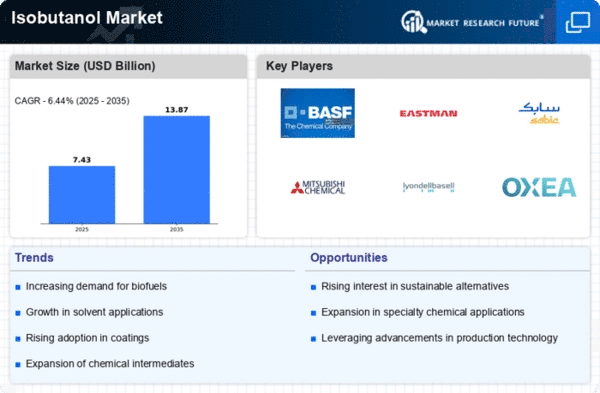Top Industry Leaders in the Isobutanol Market

Isobutanol Market
The global isobutanol market is a dynamic arena fueled by rising demand for its versatile applications in chemicals, fuels, and pharmaceuticals. The competition is intense, with established players and innovative startups vying for market share. To navigate this landscape, understanding the key strategies, market dynamics, and recent developments is crucial.
Strategies Shaping the Competition:
-
Product Diversification: Major players like Dow Chemical, BASF, and Gevo Inc. are expanding their portfolios beyond traditional fossil-fuel based isobutanol to include bio-based options derived from renewable sources like corn or sugarcane. This caters to the growing demand for sustainable products and strengthens their environmental profile. -
Technological Advancements: Investments in process optimization and bio-isobutanol production technologies are increasing. Companies like Sasol Limited and Mitsubishi Chemical Corporation are actively researching novel fermentation pathways and catalysts to improve cost-efficiency and yield. -
Regional Expansion: Emerging markets in Asia Pacific and Latin America offer significant growth potential due to their booming chemical and fuel industries. Established players are setting up production facilities and distribution networks in these regions to capitalize on this potential. -
Vertical Integration: Some companies are pursuing vertical integration to gain control over the entire supply chain, from feedstock to end products. This strategy helps secure raw materials, optimize costs, and improve product quality. -
Partnerships and Acquisitions: Collaborations and acquisitions are commonplace in the isobutanol market. Partnerships allow companies to share resources, expertise, and market access, while acquisitions provide opportunities for rapid expansion and access to new technologies.
Factors Influencing Market Share:
-
Production Capacity: Companies with larger production capacities and efficient manufacturing processes enjoy a cost advantage and can capture a larger market share. -
Product Quality and Innovation: Offering high-quality, customized isobutanol solutions tailored to specific end-user needs is crucial for differentiation and market leadership. -
Brand Reputation and Distribution Network: Established brands with strong reputations and extensive distribution networks have a natural advantage in reaching customers and building trust. -
Sustainability Initiatives: Demonstrating commitment to sustainability through bio-based production and resource efficiency attracts environmentally conscious consumers and investors. -
Regulatory Landscape: Fluctuations in government regulations and policies related to biofuels, chemical production, and environmental standards can impact demand and disrupt market dynamics.
Key Players
Some of the prominent players operating in the global isobutanol market are BASF SE (Germany), Eastman Chemical Company (U.S.), Gevo (U.S.), Butamax® Advanced Biofuels LLC (U.S.), Sahara PCC (Saudi Arabia), The Dow Chemical Company (U.S.), Mitsubishi Chemical Corporation (Japan), OXEA GmbH (Germany), INEOS (UK), SIBUR (Russia), Lesaffre Advanced Fermentations (France) among others.
Recent Developments:
September 2023: Sasol Limited successfully tests a novel fermentation process for bio-isobutanol production from sugarcane bagasse, potentially unlocking a new feedstock source.
October 2023: The Chinese government announces subsidies for bio-isobutanol production, further solidifying China's commitment to renewable fuels and boosting market demand.
November 2023: Gevo Inc. secures a new funding round of $100 million to support its bio-isobutanol expansion plans, highlighting investor confidence in the technology's future.
December 2023: A consortium of leading research institutions launches a collaborative project to develop next-generation bio-isobutanol production technologies, emphasizing continuous innovation in the market.










